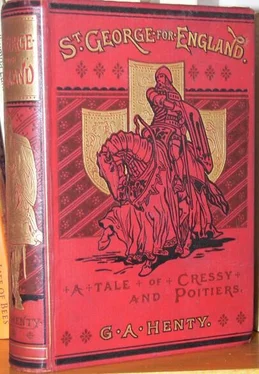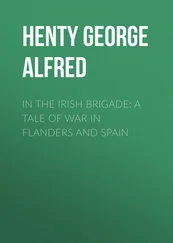G. Henty - St. George for England - A Tale of Cressy and Poitiers
Здесь есть возможность читать онлайн «G. Henty - St. George for England - A Tale of Cressy and Poitiers» весь текст электронной книги совершенно бесплатно (целиком полную версию без сокращений). В некоторых случаях можно слушать аудио, скачать через торрент в формате fb2 и присутствует краткое содержание. Жанр: Старинная литература, на английском языке. Описание произведения, (предисловие) а так же отзывы посетителей доступны на портале библиотеки ЛибКат.
- Название:St. George for England: A Tale of Cressy and Poitiers
- Автор:
- Жанр:
- Год:неизвестен
- ISBN:нет данных
- Рейтинг книги:3 / 5. Голосов: 1
-
Избранное:Добавить в избранное
- Отзывы:
-
Ваша оценка:
- 60
- 1
- 2
- 3
- 4
- 5
St. George for England: A Tale of Cressy and Poitiers: краткое содержание, описание и аннотация
Предлагаем к чтению аннотацию, описание, краткое содержание или предисловие (зависит от того, что написал сам автор книги «St. George for England: A Tale of Cressy and Poitiers»). Если вы не нашли необходимую информацию о книге — напишите в комментариях, мы постараемся отыскать её.
St. George for England: A Tale of Cressy and Poitiers — читать онлайн бесплатно полную книгу (весь текст) целиком
Ниже представлен текст книги, разбитый по страницам. Система сохранения места последней прочитанной страницы, позволяет с удобством читать онлайн бесплатно книгу «St. George for England: A Tale of Cressy and Poitiers», без необходимости каждый раз заново искать на чём Вы остановились. Поставьте закладку, и сможете в любой момент перейти на страницу, на которой закончили чтение.
Интервал:
Закладка:
The Black Prince held his station until night without yielding a single step to all the efforts of the French. Gradually, however, the assailants became less and less numerous, the banners disappeared, and the shouts of the leaders and the clang of arms died away, and the silence which prevailed over the field at once announced that the victory was complete and the enemy in full flight. An immense number of torches were now lighted through the English lines, and the king, quitting for the first time his station on the hill, came down to embrace his gallant son. Edward and his host rejoiced in a spirit of humility over the victory. No songs of triumph, no feastings or merriment were permitted, but a solemn service of the Church was held, and the king and his soldiers offered their thanks to God for the victory he had given them. The English army lay all night under arms, and a number of scattered parties of the French wandering about in the darkness entered the lines and were slain or taken prisoners.
The dawn of the next morning was thick and foggy, and intelligence coming in that a large body of the enemy were advancing upon them, the Earls of Northampton, Warwick, and Norfolk, with five hundred men-at-arms and two thousand archers, went out to reconnoiter, and came in the misty twilight upon an immense force composed of the citizens of Beauvais, Rouen, and some other towns, led by the Grand Prior of France and the Archbishop of Rouen, who were approaching the field.
By some extraordinary accident they had not met any of the fugitives flying from Cressy, and were ignorant that a battle had been fought. The English charged them at once. Their advance-guard, consisting of burghers, was easily overthrown. The second division, which was composed of men-at-arms, fought bravely, but was unable to withstand the charge of the triumphant English, and was completely broken and defeated. The grand prior was killed and a vast number of his followers slain or captured. During the whole of the morning detached parties from Edward's army scoured the country, dispersing and slaughtering bands of French who still remained together, and toward night the Earl of Northampton returned to the camp with the news that no enemy remained in the vicinity that could offer a show of resistance to the English force.
It is said that a far greater number of French were killed upon the second day than upon the first. This can be accounted for by the fact that on the first day but a small portion of the English army were engaged, and that upon the second the English were fresh and vigorous, and their enemies exhausted and dispirited.
The greater number of the French nobles and knights who fell died in their attempt to break through the Black Prince's array. Besides the King of Bohemia, nine sovereign princes and eighty great nobles were killed, with twelve hundred knights, fifteen hundred men-at-arms, and thirty thousand foot; while on the English side only three knights and a small number of men-at-arms and infantry were killed. The body of the King of Bohemia and those of the other great leaders were carried in solemn pomp to the Abbey of Maintenay. Edward himself and his son accompanied them as mourners.
On the Monday following Edward marched with his army against Calais, and summoned the town to surrender. John of Vienne, who commanded the garrison, refused to comply with the demand. The fortifications of the town were extremely strong and the garrison numerous, and Edward perceived that an assault would be very unlikely to succeed, and would entail great loss, while a repulse would have dimmed the luster of the success which he had gained. He therefore determined to reduce it by famine, and the troops were set to work to build huts. So permanently and strongly were these constructed that it seemed to the enemy that King Edward was determined to remain before Calais even should he have to stay there for ten years.
Proclamations were issued in England and Flanders inviting traders to establish stores and to bring articles of trade of all kinds, and in a short time a complete town sprang up which was named by Edward New-Town the Bold. The English fleet held complete possession of the sea, cutting off the besieged from all succor by ship, and enabling abundant supplies for the army to be brought from England and Flanders. Strong parties were sent out in all directions. The northern provinces of France were scoured, and the army was amply provided with necessaries and even luxuries.
After the first terrible shock caused by the crushing defeat of Cressy, King Philip began at once to take measures for the relief of Calais, and made immense efforts again to put a great army in the field. He endeavored by all means in his power to gain fresh allies. The young Count of Flanders, who at the death of his father at Cressy was sixteen years of age, was naturally even more hostile to the English than the late prince had been, and he strove to win over his subjects to the French alliance, while Philip made them magnificent offers if they would join him. The Flemings, however, remained stanch to the English alliance, and held their prince in duress until he at last consented to marry the daughter of Edward. A week before the date fixed for the nuptials, however, he managed to escape from the vigilance of his guards when out hawking, and fled to the court of France.
In Scotland, Philip was more successful, and David Bruce, instead of employing the time given him by the absence of Edward with his armies in driving out the English garrisons from the strong places they still held in Scotland, raised an army of fifty thousand men and marched across the border into England plundering and ravaging. Queen Philippa, however, raising an army, marched against him, and the Scotch were completely defeated at Neville's Cross, fifteen thousand being killed and their king himself taken prisoner.
Walter's conduct at the battle of Cressy gained him still further the favor of the Black Prince. The valor with which he had fought was conspicuous even on a field where all fought gallantly, and the prince felt that more than once he would have been smitten down had not Walter's sword interposed. Ralph too had fought with reckless bravery, and many French knights and gentlemen had gone down before the tremendous blows of his heavy mace, against which the stoutest armor availed nothing. After the battle the prince offered to make him an esquire in spite of the absence of gentle blood in his veins, but Ralph declined the honor.
"An it please you, Sir Prince," he said, "but I should feel more comfortable among the men-at-arms, my fellows. In the day of battle I trust that I should do no discredit to my squirehood, but at other times I should feel woefully out of my element, and should find naught for my hands to do; therefore, if it so pleases your royal highness, I would far rather remain a simple man-at-arms."
Ralph did not, however, refuse the heavy purse which the prince gave him, although indeed he, as well as all the soldiers, was well supplied with money, so great were the spoils which the army had gathered in its march before Cressy, and which they now swept off in their raids among the northern provinces of France.
One evening Walter was returning from a banquet at the pavilion of the Prince of Wales, with Ralph as usual following at a little distance, when from a corner of the street a man darted suddenly out and struck a dagger with all his force between his shoulders. Well was it for Walter that he had taken Geoffrey's advice, and had never laid aside the shirt of mail, night or day. Fine as was its temper, two or three links of the outer fold were broken, but the point did not penetrate the second fold, and the dagger snapped in the hand of the striker. The force of the sudden blow, however, hurled Walter to the ground. With a loud cry Ralph rushed forward. The man instantly fled. Ralph pursued him but a short distance and then hastened back to Walter.
Читать дальшеИнтервал:
Закладка:
Похожие книги на «St. George for England: A Tale of Cressy and Poitiers»
Представляем Вашему вниманию похожие книги на «St. George for England: A Tale of Cressy and Poitiers» списком для выбора. Мы отобрали схожую по названию и смыслу литературу в надежде предоставить читателям больше вариантов отыскать новые, интересные, ещё непрочитанные произведения.
Обсуждение, отзывы о книге «St. George for England: A Tale of Cressy and Poitiers» и просто собственные мнения читателей. Оставьте ваши комментарии, напишите, что Вы думаете о произведении, его смысле или главных героях. Укажите что конкретно понравилось, а что нет, и почему Вы так считаете.












